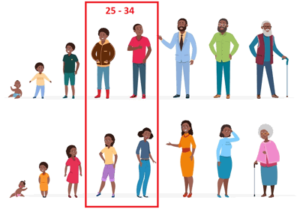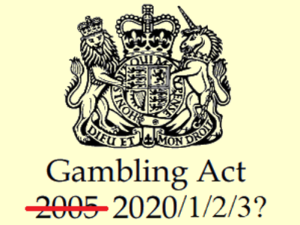How Many Betting Accounts Do People Have on Average?
 It would be naive to think that everyone who is active in the online gambling scene is placing bets through one single website. Nobody can argue the fact that there are hundreds of platforms to choose from these days, especially with big-name brands like Bet365, William Hill and Paddy Power being around. Sites put a huge amount of effort and resources into new customer offers to attract new users and then into retention offers to keep them. It is not really a surprise that people would take advantage of these deals on multiple sites. Keeping multiple accounts also allows punters to compare odds and try to find the best terms for any given bet.
It would be naive to think that everyone who is active in the online gambling scene is placing bets through one single website. Nobody can argue the fact that there are hundreds of platforms to choose from these days, especially with big-name brands like Bet365, William Hill and Paddy Power being around. Sites put a huge amount of effort and resources into new customer offers to attract new users and then into retention offers to keep them. It is not really a surprise that people would take advantage of these deals on multiple sites. Keeping multiple accounts also allows punters to compare odds and try to find the best terms for any given bet.
While it may not stand out as being surprising that many gamblers actually possess more than one gambling account in the online world. But what is considered to be the average number of accounts held by online bettors? Is this increasing or decreasing and what are the potential longer term impacts?
Research has been conducted in recent times that delves fully into this that shows there is a general average across the United Kingdom for the number of betting accounts held by players. But does the figure differentiate across different age groups? Or perhaps it differs depending upon the area of the country that people are residing in. Plus, what effect could the new legislation being introduced by the UK Government have on the number of accounts held by players across the country?
Overview of Gambling in the United Kingdom
 The most recent data surrounding online gambling behaviour in the UK was conducted in 2020 and came from a survey of around 8,000 adults. Via various questions asked, the results of the survey showed the following information:
The most recent data surrounding online gambling behaviour in the UK was conducted in 2020 and came from a survey of around 8,000 adults. Via various questions asked, the results of the survey showed the following information:
- Most people in the United Kingdom access online gambling via a mobile phone, and this is something particularly common amongst young people.
- Despite mobile devices being the most popular device for online gambling activity, laptops, PCs and tablets managed to halt recent declines in 2020.
- Most online gambling takes place from within the home, although one in five gamblers noted that they have also partaken in gambling outside as well.
- Online gamblers hold around three accounts on average, although a significant number of younger survey respondents were noted to hold more than that figure.
- The majority of people engaging in online betting have accessed in-play betting, with rates of such remaining high for younger people.
- eSports betting is continually growing, and this has been fuelled more specifically by younger male gamblers.
Remote gambling remains the largest industry sector for the United Kingdom gambling sector, as it generates a Gross Gambling Yield (GGY) of £5.7 billion, and this comprises of around 40% of the overall market revenue. A marked year-on-year increase has been seen in online gambling participation, as in 2020, around one in four adults responded that they had gambled online within the last four weeks. That stands out as an increase from five years ago when one in six had the same answer.
The arrival of COVID-19 in 2020 was noted as a significant reason why many people had turned to the online gambling scene. Due to the various restrictions imposed on peoples’ every day lives, including the temporary closure of land-based gambling establishments, the online scene experienced quite the jolt.
Average 3 Accounts But Younger Gamblers Have More
 The most important result for us to look at in that research though is the number of accounts held on average by players. Three is the number that was worked out as the average, although a significant portion of younger bettors were displayed as holding more. Yet the current data being provided gives a narrow view of this, primarily due to operator weaknesses. The current approach to customer data by these operators sees them limited when it comes to observing customer participation on their own products.
The most important result for us to look at in that research though is the number of accounts held on average by players. Three is the number that was worked out as the average, although a significant portion of younger bettors were displayed as holding more. Yet the current data being provided gives a narrow view of this, primarily due to operator weaknesses. The current approach to customer data by these operators sees them limited when it comes to observing customer participation on their own products.
The Commission, following the publication of these results, issued a challenge to the industry. This requested it to work together on ways that data could be used in order to create what it defined as a ‘single customer view’. This was noted as part of the regulatory body’s kick start on making gambling safer in the United Kingdom.
It is key to note that the average number of betting accounts held by players standing at 3 is pretty much the same average as has been reported over the last few years. That being said, data does show that the number is increasing, with a mean figure of 3.2 accounts per person in 2020, which is higher than the mean reported in 2018 of 2.7 accounts. Previous survey data on the mean number of accounts held by UK players, dating back to 2016 is as follows:
| Year | Ave Accounts Held | Ave Accounts Used Past 12 Months |
|---|---|---|
| 2016 | 3.0 | 2.2 |
| 2017 | 2.8 | 2.0 |
| 2018 | 2.7 | 1.9 |
| 2019 | 3.0 | 2.1 |
| 2020 | 3.2 | 2.1 |
It is key to reference that although the mean number of accounts held by players in the UK has increased to 3.2, the ones being used actively for gambling in the past 12 months remains exactly the same as it was in 2019. Therefore, the fact that more accounts have been opened does not necessarily mean that those same accounts have been actively used by the country’s gamblers in the 12-month survey period.
Average Demographics for Betting Accounts
 It is one thing to look at the mean number of accounts, but this only gives a simple look into things. The average data suggests that male players tend to have more online gambling accounts than females. Furthermore, they tend to utilise those accounts on a more frequent basis as well. Younger gamblers were found to possess more online accounts on average than anyone else, and these are in use more often than those accounts possessed by the over 55 demographic.
It is one thing to look at the mean number of accounts, but this only gives a simple look into things. The average data suggests that male players tend to have more online gambling accounts than females. Furthermore, they tend to utilise those accounts on a more frequent basis as well. Younger gamblers were found to possess more online accounts on average than anyone else, and these are in use more often than those accounts possessed by the over 55 demographic.
Just under a fifth of 18-34-year-olds responded that they hold five or more online betting accounts. In comparison to the 5% of those aged 65 or over with five or more, that figure speaks volumes.
What remains very clear from the completion of the survey though is that there has been an increase in the number of gambling accounts being opened in general.
The Potential Impact of New UK Gambling Industry Rules
 One of the biggest situations brewing in the UK gambling scene right now is the government’s restructuring of the Gambling Act 2005 to fit today’s much more modern and digital age. While nothing has been confirmed in terms of the new legislation that will be introduced, many rumours have been circulating about potential adjustments and complete changes. Amongst the proposed and potential alterations to the law surrounds affordability checks for players.
One of the biggest situations brewing in the UK gambling scene right now is the government’s restructuring of the Gambling Act 2005 to fit today’s much more modern and digital age. While nothing has been confirmed in terms of the new legislation that will be introduced, many rumours have been circulating about potential adjustments and complete changes. Amongst the proposed and potential alterations to the law surrounds affordability checks for players.
The rumour that has been mentioned regarding this is that gambling firms could be forced into asking their registered users to produce evidence of their capability to afford gambling with them. This would require payslips to be submitted so that compliance teams could verify that a player has enough income coming in each week or month to support their gambling activity. Chris Philip, the minister who took over as gambling minister in September of 2020, said that the Commission has a “moral obligation” to tackle gambling addiction. The introduction of these affordability checks could be one of the ways that this is done.
This would certainly ensure that a much tougher regulatory environment is experienced in the UK, and it would also have the potential to reduce revenue from the sector. And it could also affect the number of accounts that players possess. If someone has to go through proving their income with a payslip or other route when opening an online betting account, would they really want to do this at more than one website? Not only does it seem like quite the breach of a person’s privacy, but it’s also a bind when it comes to having to submit the information and then wait for it to be verified before a deposit and betting action could begin.
The UK Government did make the statement that any new affordability checks introduced by the Commission should harmonise with the current act review. During a consultation from the Commission on remote customer interaction, which ended in February 2020, there was a proposal for monthly net gambling loss to be stopped at £100. After this, bettors would need to prove that they could afford to continue gambling. And while that is a better outcome than having to go through affordability checks straight away, it still seems like it would be a bad result for the industry.
It didn’t take long for the British racing industry to fire back, with leaders warning that the sport would likely lose around £60 million every year if this legislation were to be introduced. Affordability checks, it said, would discourage people from participating in gambling due to the intrusive nature of the financial queries that sportsbooks and casinos would be forced into asking of their clients.
In the end, if a potential player knew that they were going to have to suffer through such questioning and submission of personal and private financial data, would they end up bothering with it at all? Critically it could also encourage people to bet with unlicensed sites on the black market, where no protections exist.
Changes in Favour of Multiple Account Players?
 The whitepaper for the proposed changes to the law is set to published in the first quarter of 2022. Within that, it is also expected that some sort of limitations are introduced on gambling as well. This could be in the shape of deposit limits, stake limits, loss limits, time limits on games and so on. Yet could these sorts of changes work in the favour of those players who prefer to have more than one account?
The whitepaper for the proposed changes to the law is set to published in the first quarter of 2022. Within that, it is also expected that some sort of limitations are introduced on gambling as well. This could be in the shape of deposit limits, stake limits, loss limits, time limits on games and so on. Yet could these sorts of changes work in the favour of those players who prefer to have more than one account?
While the introduction of these tools are there so as to help responsible gambling take place, they may actually assist with those players who like possessing more than one account. Essentially, if you are restricted by depositing limits, then having multiple accounts would theoretically mean that you can deposit more simply by spreading the funds across several of them. If you are limited to depositing £100 per week at online casinos and sportsbooks, what’s to stop you opening five accounts and depositing the maximum at all of them? (Other than the potential affordability checks, of course!). In the same vein, if you are restricted by stake limits on games, then could you not just load the same game up at three different platforms and use your deposited funds at all of them at the same time?
If a time limit for playing specific casino games has been introduced at one site, then you could go through the 30 minutes of legal game time at one site before simply logging into another account elsewhere and playing for another 30 minutes on the same game. If the Commission and the UK Government want to enact such legislation, then such restrictions would need to be sturdy enough across that they cover activity across multiple platforms. But is there even the possibility of doing this, considering that each different brand operates on its own merit, rather than under one and the same umbrella as the rest?
Doubtless, the government has had a lot to consider, and we will only know the intentions for the gambling industry once the whitepaper has been published and everyone can see it. Whether players are better off after the new legislation is introduced remains to be seen, too. One thing is for certain – the average number of accounts held by players is on the increase. Generally, it depends upon how you look at things as to whether you consider this to be a good thing or a bad thing.



